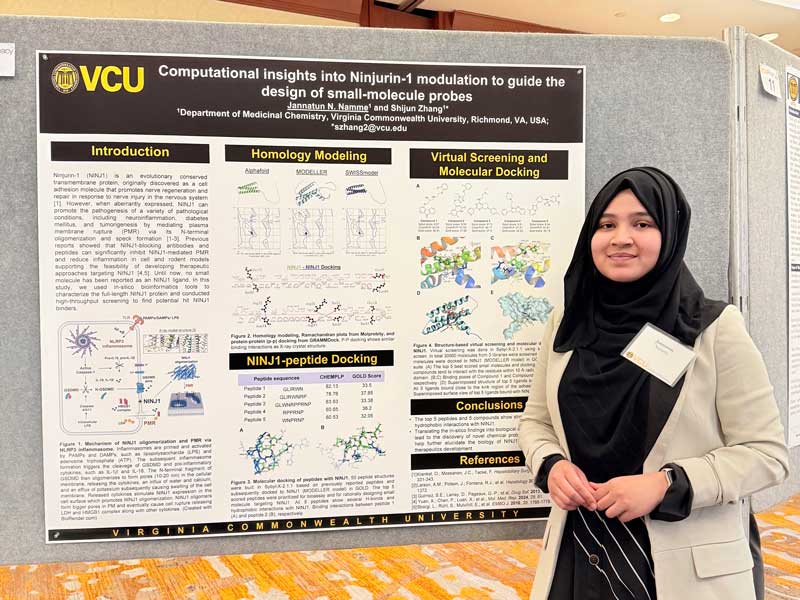Small molecule could alleviate acetaminophen-induced liver injury, Medicinal Chemistry student's research reveals
Aug. 21, 2025

Acetaminophen is one of the most common painkillers and is found in hundreds of different medications. While safe at recommended doses, acetaminophen overdose is the leading cause of acute liver injury in the U.S. Now, researchers at Virginia Commonwealth University propose that a new molecule has the potential to treat acetaminophen-induced liver injury (AILI) and other inflammatory conditions. They conducted a small-scale mouse trial and found that the new compound decreased AILI-caused liver inflammation and prevented liver damage.
Jannatun Nayem Namme, a Ph.D. student in the Department of Medicinal Chemistry at VCU School of Pharmacy, will present her team's results at the fall meeting of the American Chemical Society (ACS). ACS Fall 2025 is being held Aug. 17-21; it features about 9,000 presentations on a range of science topics.
ACS shared this news release on Aug. 18, 2025.
Most acetaminophen overdoses are accidental, often due to people unintentionally consuming multiple products containing the painkiller or misinterpreting dosage. After taking a recommended amount of acetaminophen, a person's liver converts a small percentage of it into a toxic molecule called N-acetyl-p-benzoquinone imine (NAPQI). Normally, the liver can quickly metabolize NAPQI into a non-toxic form. But if a person takes too much acetaminophen, NAPQI builds up and causes irreversible cell damage, leading to liver injury or death. Currently, N-acetylcysteine is the only drug available to treat AILI, and it must be administered within eight hours of overdose.
To develop novel treatments for inflammatory conditions, such as AILI, and neurodegenerative conditions, Namme and her colleagues previously focused on small molecules that reduce the activity of inflammation-causing proteins, known as inflammasomes. Inflammasomes are also involved in pyroptosis, a type of cellular death associated with AILI. While developing inflammasome inhibitors, the researchers noticed that some of the compounds they created could target a specific inflammatory protein called gasdermin D (GSDMD). GSDMD is involved in pyroptosis.
Namme and the team synthesized several different GSDMD-inhibiting compounds and tested them for their ability to bind to GSDMD. They discovered that one small molecule, which they labeled YM81, selectively binds to and inhibits GSDMD from initiating pyroptosis.
Next, the researchers treated five mice with AILI using YM81 and compared them to 10 mice given a placebo. They monitored the extent of liver damage in the animals 17 hours after the acetaminophen overdose. Compared to the placebo group, mice treated with YM81 had significantly lower levels of alanine transaminase and aspartate transaminase, two liver injury biomarkers. These results indicate that the YM81 treatment helped decrease liver inflammation by inhibiting GSDMD.
Shijun Zhang, Ph.D., the study's principal investigator and a professor in the Department of Medicinal Chemistry, says that YM81 is in the early stages of drug development. "In the future, we will focus on optimizing YM81 to increase its potency, safety and stability, in addition to exploring its therapeutic potential in additional animal models," he says.
Namme adds that GSDMD inhibitors like YM81 have the potential to treat other inflammatory conditions. "GSDMD is a common protein involved in multiple inflammatory and neurodegenerative diseases, such as arthritis, sepsis and gout," she says. "Targeting GSDMD could offer a therapeutic strategy to reduce the inflammation and damage from multiple diseases and causes."
The research was partially funded by the National Institute of Aging of the U.S. National Institutes of Health.
Visit the ACS Fall 2025 program to learn more about this presentation, "Development of a novel GSDMD inhibitor for the treatment of acetaminophen-induced liver injury," and other science presentations.